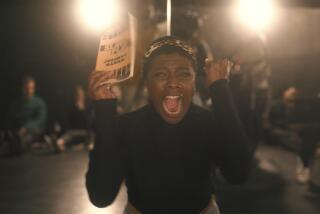STAGE REVIEW : ‘Let’s Play Two’ Strikes Out in the End
- Share via
The title, “Let’s Play Two,” has more levels than the play itself.
Anthony Clarvoe took the moniker for his new romantic comedy about two baseball fans from a line by Ernie Banks: “It’s a great day for a ball game. Let’s play two.”
At South Coast Repertory, the title also can be read as “Let’s play, too,” which is more or less what Grace (Susan Cash) hears from Phil (Arye Gross) when, for example, he tells her, “You’re a way more serious person than I am.”
Or try this interpretation: Grace and Phil are playing at being a twosome. They’re pretending to be made for each other, but in fact their union might be doomed. That’s the thrust of the action: Grace’s attempt to discern whether this thing with Phil is real and lasting.
It’s hard to tell about Phil. He’s a lot of fun, but he just might lack staying power.
That’s a quick way of describing the play, too. It’s good for laughs, but does it add up? The ending is as sunny as Phil’s personality, but the optimism isn’t fully justified.
Certainly Clarvoe takes great pains to point out the differences between his two characters, with considerable wit.
Grace is 34, divorced, childless, worried about her job in retailing, and tired of being a bridesmaid. Phil is 28, never married but coming off a 10-day relationship that he regarded as meaningful, unconcerned about whether he keeps his job (in personnel, no less). He thinks of other people’s weddings primarily as great cheap dates.
They met each other on one of these great cheap dates and got to know each other, carnally speaking, after another. Now they’re on their way to yet another wedding, somewhere in the countryside outside their homes in the Twin Cities, but this one doesn’t look as if it will join the hall of fame of great cheap dates.
They’re lost, and she’s sick. Not just sick, but worried that she might be pregnant--a concern she chooses not to share with Phil.
As they travel the freeways and back roads, Phil seizes the opportunity to announce his love for Grace, yet also to share--sometimes intentionally, sometimes unwittingly--some of his own doubts about his ability to sustain a relationship. Meanwhile, we accompany the two of them on flashbacks into their mutual past and on imagined daydreams about their possible futures.
Eventually, they give up on finding the wedding and decide to go on Phil’s idea of “a road trip.” The rules of the game: Just drive, assiduously avoiding looking at maps or signs, and see what happens. This resembles Phil’s philosophy of how to live his life.
Michael Bloom’s staging takes us along for most of the ride without serious protest. Cash and Gross are ideally cast.
Cash is literally flushed--with sickness, with anxiety, with excitement, and we can read on her face that her attachment to the Minnesota Twins is an escape valve. Gross is likably frisky, with a shock of hair that wanders across his forehead, charting his insouciance about his future. He finally says in so many words what we figured out earlier from his performance: this guy’s devotion to the Twins is his security blanket more than his escape valve.
John Iacovelli met the challenge of doing a “road movie” on South Coast’s smaller Second Stage with nifty invention. The frame of Phil’s shiny red Mustang scoots around the stage, a hamburger stand squawk box drops from above, a moon pops up in the rear for the night scenes. Costumer Dwight Richard Odle apparently relished the task of finding a succession of hideous bridesmaid outfits for poor Grace.
It’s only in the last inning that Clarvoe stumbles. The breakdown starts with a few little logistical details. For example, though they have no idea where they are, beyond somewhere in the rural Midwest, Grace has no problem finding a clinic for a quickie obstetrical exam. Fresh casual clothes appear out of nowhere--and these are not the play’s dream sequences.
More important, it takes only one of Grace’s fantasies about the future and one brief speech for Phil to convince her that everything else we have learned about his personality shouldn’t matter, nor should their recent shouting match.
OK, it’s a romantic comedy, where the benefit of the doubt goes to the side of romance. We might be able to accept this, if Clarvoe didn’t cross the line of acceptable cuteness in his very last scene. Without giving away the ending, let’s just say that it sounds as if Clarvoe wants everyone to say “Ahhhh. . . . “ in unison when they hear his final pun. No thanks. His characters deserve better than this kind of playwright’s manipulation.
* “Let’s Play Two,” South Coast Repertory, 655 Town Center Drive, Costa Mesa. Tuesdays-Saturdays, 8 p.m.; Sundays, 7:30 p.m., Saturday-Sunday matinees, 2:30 p.m. Ends Oct. 11. $23-$32. (714) 957-4033. Running time: 1 hour, 50 minutes. Susan Cash: Grace
Arye Gross: Phil
By Anthony Clarvoe. Directed by Michael Bloom. Sets John Iacovelli. Lights Brian Gale. Music and sound Nathan Birnbaum. Costumes Dwight Richard Odle. Production manager Edward Lapine. Stage manager Andy Tighe.
More to Read
The biggest entertainment stories
Get our big stories about Hollywood, film, television, music, arts, culture and more right in your inbox as soon as they publish.
You may occasionally receive promotional content from the Los Angeles Times.










